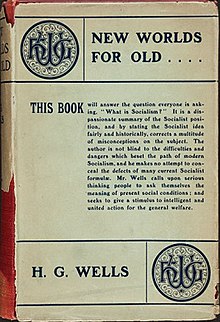
Anti-capitalism is a political ideology and movement encompassing a variety of attitudes and ideas that oppose capitalism. In this sense, anti-capitalists are those who wish to replace capitalism with another type of economic system, such as socialism or communism.
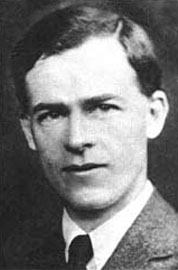
George Douglas Howard Cole was an English political theorist, economist, and historian. As a believer in common ownership of the means of production, he theorised guild socialism. He belonged to the Fabian Society and was an advocate for the co-operative movement.

The Open Conspiracy: Blue Prints for a World Revolution was published in 1928 by H. G. Wells, when he was 62 years old. It was revised and expanded in 1930 with the additional subtitle A Second Version of This Faith of a Modern Man Made More Explicit and Plain. In 1931 a further revised edition appeared titled What Are We to Do with Our Lives?. A final version appeared in 1933 under its original title. Many of its ideas are anticipated in Wells's 1926 novel The World of William Clissold.

Tono-Bungay is a realist semiautobiographical novel written by H. G. Wells and first published in book form in 1909. It has been called "arguably his most artistic book". It had been serialised before book publication, both in the United States, in The Popular Magazine, beginning in the issue of September 1908, and in Britain, in The English Review, beginning in the magazine's first issue in December 1908.
Anarchist economics is the set of theories and practices of economic activity within the political philosophy of anarchism. Many anarchists are anti-authoritarian anti-capitalists, with anarchism usually referred to as a form of libertarian socialism, i.e. a stateless system of socialism. Anarchists support personal property and oppose capital concentration, interest, monopoly, private ownership of productive property such as the means of production, profit, rent, usury and wage slavery which are viewed as inherent to capitalism.
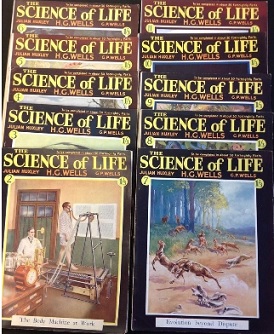
The Science of Life is a book written by H. G. Wells, Julian Huxley and G. P. Wells, published in three volumes by The Waverley Publishing Company Ltd in 1929–30, giving a popular account of all major aspects of biology as known in the 1920s. It has been called "the first modern textbook of biology" and "the best popular introduction to the biological sciences". Wells's most recent biographer notes that The Science of Life "is not quite as dated as one might suppose".
Anarchism is generally defined as the political philosophy which holds the state to be undesirable, unnecessary and harmful as well as opposing authority and hierarchical organization in the conduct of human relations. Proponents of anarchism, known as anarchists, advocate stateless societies based on non-hierarchical voluntary associations. While anarchism holds the state to be undesirable, unnecessary and harmful, opposition to the state is not its central or sole definition. Anarchism can entail opposing authority or hierarchy in the conduct of all human relations.

The Fabian Society is a British socialist organisation whose purpose is to advance the principles of social democracy and democratic socialism via gradualist and reformist effort in democracies, rather than by revolutionary overthrow. The Fabian Society was also historically related to radicalism, a left-wing liberal tradition.
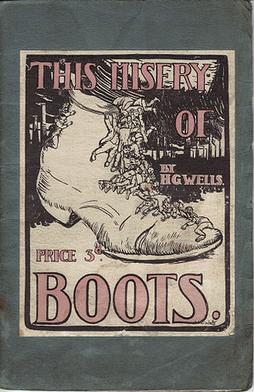
This Misery of Boots is a 1907 political tract by H. G. Wells advocating socialism. Published by the Fabian Society, This Misery of Boots is the expansion of a 1905 essay with the same name. Its five chapters condemn private property in land and means of production and calls for their expropriation by the state "not for profit, but for service."
The New Machiavelli is a 1911 novel by H. G. Wells that was serialised in the English Review in 1910. Because its plot notoriously derived from Wells's affair with Amber Reeves and satirised Beatrice and Sidney Webb, it was "the literary scandal of its day."
The Future in America: A Search After Realities is a 1906 travel essay by H. G. Wells recounting his impressions from the first of half a dozen visits he would make to the United States. The book consists of fifteen chapters and a concluding "envoy".

First and Last Things is a 1908 work of philosophy by H. G. Wells setting forth his beliefs in four "books" entitled "Metaphysics," "Of Belief," "Of General Conduct," and "Some Personal Things." Parts of the book were published in the Independent Magazine in July and August 1908. Wells revised the book extensively in 1917, in response to his religious conversion, but later published a further revision in 1929 that restored much of the book to its earlier form. Its main intellectual influences are Darwinism and certain German thinkers Wells had read, such as August Weismann. The pragmatism of William James, who had become a friend of Wells, was also an influence.

An Englishman Looks at the World is a 1914 essay collection by H. G. Wells containing journalistic pieces written between 1909 and 1914. The book consists of twenty-six pieces ranging from five to sixty-two pages in length. An American edition was published the same year by Harper and Brothers under the title Social Forces in England and America.
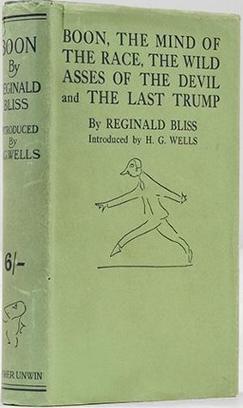
Boon is a 1915 work of literary satire by H. G. Wells. It purports, however, to be by the fictional character Reginald Bliss, and for some time after publication Wells denied authorship. Boon is best known for its part in Wells's debate on the nature of literature with Henry James, who is caricatured in the book. But in Boon Wells also mocks himself, calling into question and ridiculing a notion he held dear—that of humanity's collective consciousness.
State socialism is a political and economic ideology within the socialist movement that advocates state ownership of the means of production. This is intended either as a temporary measure, or as a characteristic of socialism in the transition from the capitalist to the socialist mode of production or to a communist society. State socialism was first theorised by Ferdinand Lassalle. It advocates a planned economy controlled by the state in which all industries and natural resources are state-owned.

A Year of Prophesying collects 55 newspaper columns written by H. G. Wells in 1923 and 1924.
Types of socialism include a range of economic and social systems characterised by social ownership and democratic control of the means of production and organizational self-management of enterprises as well as the political theories and movements associated with socialism. Social ownership may refer to forms of public, collective or cooperative ownership, or to citizen ownership of equity in which surplus value goes to the working class and hence society as a whole. There are many varieties of socialism and no single definition encapsulates all of them, but social ownership is the common element shared by its various forms Socialists disagree about the degree to which social control or regulation of the economy is necessary, how far society should intervene, and whether government, particularly existing government, is the correct vehicle for change.

The Holy Terror is a 1939 work by H. G. Wells that is in part an analysis of fascism and in part a utopian novel.

Anticipations of the Reaction of Mechanical and Scientific Progress upon Human Life and Thought, generally known as Anticipations, was written by H.G. Wells at the age of 34. He later called the book, which became a bestseller, "the keystone to the main arch of my work." His most recent biographer, however, calls the volume "both the starting point and the lowest point in Wells's career as a social thinker."
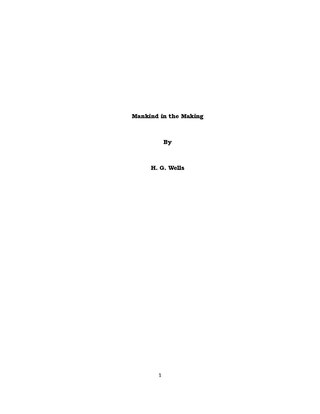
Mankind in the Making (1903) is H.G. Wells's sequel to Anticipations (1901). Mankind in the Making analyzes the "process" of "man's making," i.e. "the great complex of circumstances which mould the vague possibilities of the average child into the reality of the citizen of the modern state." Taking an aggressive tone in criticizing many aspects of contemporary institutions, Wells proposed a doctrine he called "New Republicanism," which "tests all things by their effect upon the evolution of man."
